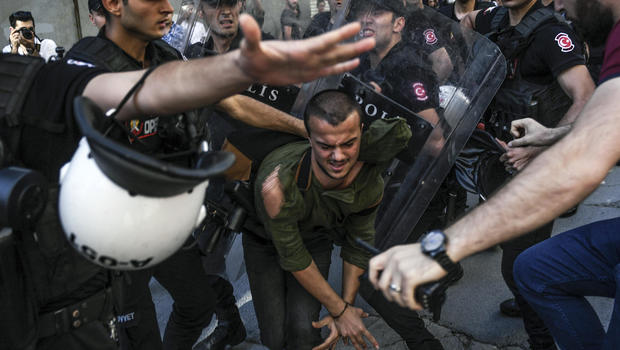Turkey Police Stops Pride March in Istanbul
 |
| A plainclothes police officer kicks an LGBT rights activist as Turkish police enforce a ban imposed on the Pride Parade in Istanbul. An estimated 20 people were detained. |
Police in the Turkish city of Istanbul has thwarted attempts by organizers to hold a banned Gay Pride march.
The organizers of the annual event had vowed to press ahead despite the ban by the authorities, who had cited threats from far-right groups.
But police briefly fired rubber bullets to disperse the marchers and detained a number of them.
Homosexuality is not illegal in Turkey - unlike in many Muslim nations - but homophobia remains widespread.
President Recep Tayyip Erdogan, whose ruling AK Party is rooted in conservative Islam, has denied wanting to impose traditional religious values, saying he is committed to secularism. But he supports Turks' right to express their religion more openly.
He has been accused of growing authoritarianism in recent years.
'Get used to it'
This is the third year in a row that Turkey's largest city has banned the Gay Pride rally.
The BBC's Mark Lowen, in Istanbul, says the heavy police presence stopped people from entering Istiklal Street, where the rally was scheduled to start.
He says that anybody trying to unfurl a rainbow flag or pass police blockades was prevented from doing so.

Faced with armed police and water-cannon trucks, the marchers had no chance, our correspondent says.

A plainclothes police officer kicks a member of a group of LGBT rights activists as Turkish police prevent them from going ahead with a gay pride parade on June 25, 2017, in Istanbul, a day after it was banned by the city governor's office.
BULENT KILIC/AFP/GETTY IMAGES
The Hurriyet newspaper said that at least 10 people had been detained.
The Dutch newspaper De Telegraaf tweeted that a Dutch cameraman, Bram Janssen, was among those arrested.
Earlier on Sunday, the Gay Pride organizing committee had issued a statement saying: "We are not scared, we are here, we will not change.
"You are scared, you will change and you will get used to it. We are here again to show that we will fight in a determined fashion for our pride."
For more than a decade the event passed off peacefully - tens of thousands used to throng Istiklal street here.
But now, for the third year running, it's been banned, officially because of threats from ultra-nationalist groups, but critics believe that's a convenient scapegoat for a conservative government that doesn't approve of the parade.
Representatives of some European governments were here to support the cause, stressing that Turkey, still a candidate for EU membership, must respect minority rights.
But the criticism is likely to fall on deaf ears among an increasingly conservative government. For long, Turkey was a haven of gay rights in the Middle East. But the Islamist-leaning President Erdogan is accused by critics of molding Turkey in his image and ostracizing the secular, liberal side of the country.
Lara Ozlen, from the organizing committee, told AFP news agency on Saturday: "It is obvious that a peaceful march is part of our constitutional right.
"It's been known for years. Instead of protecting us, to say 'do not march' just because some will be disturbed is undemocratic."
On Sunday, the Dutch consulate in Istanbul unfurled a large rainbow flag in support of the Pride event.
In addition to citing the threats of far-right groups, city officials said they had not received a formal request to hold the march - a claim denied by the organizers.
This year's event also coincides with the end of the Muslim holy month of Ramadan and the start of the Eid al-Fitr festival.
Last year, Riot police fired tear gas and plastic bullets after transgender rights activists gathered in Istanbul - in defiance of a ban on marching.
BBC Istanbul
Comments